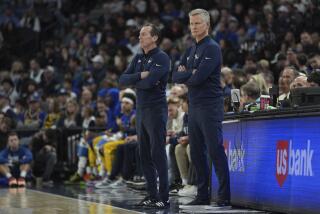No Doubt, a Spirit Runs Through Him
- Share via
Swift Eagle is coming to town, ostensibly to speak on behalf of his buddy, Tall Elk, but also to liberate some serious cash from the Lakers.
Swift Eagle, Ohnahkoh Wamblee to his Lakota Sioux pals, is Phil Jackson, who received his Sioux name because of his long arms that stretched like wings when he swooped down the basketball floor during a clinic with Bill “Tall Elk” Bradley at the Pine Ridge Reservation in South Dakota in 1973.
So writes Jackson in his autobiography “Sacred Hoops: Spiritual Lessons of a Hardwood Warrior.”
He’ll swoop into Southern California to answer questions as to why he will become the Laker coach for five seasons and $30 million, then say a few words Thursday to try to persuade folks to give Bradley four years in the White House at $200,000 per.
And probably wonder about the fiscal disparity.
Jackson writes about the “link between spirit and sport,” adding that “winning is ephemeral. Yes, victory is sweet, but it doesn’t necessarily make life any easier the next season or even the next day.”
It does make you appealing to a team that will leave it to Kurt Rambis, whom Jackson replaces as Laker coach, to write about the hell of losing.
Jackson has always been a breed apart, a product of a deeply Christian family who embraces--and questions--all religions.
He is a coach who persuaded the Bulls that the whole is greater than the sum of its parts, even when one of the parts is Michael Jordan.
Along the zigzagging way, Jackson writes, the genesis of his personal development came from Carlos Castaneda’s “The Teachings of Don Juan”: “Look at every path closely and deliberately. Try it as many times as you think necessary. Then ask yourself, and yourself alone, the question: . . . Does this path have a heart? If it does, the path is good. If it doesn’t, it is of no use.”
Inner peace has come through Zen.
“The point of Zen practice is to make you aware of the thoughts that run your life and diminish their power over you,” writes Jackson, who sits zazen on a regular basis.
”. . . In Zen, it is said that the gap between accepting things the way they are and wishing them to be otherwise is ‘the tenth of an inch of difference between heaven and hell.’ . . . This is what is meant by right action: the capacity to observe what’s happening and act appropriately, without being distracted by self-centered thoughts.”
Professional peace has come through the teachings of Tex Winter, no Zen master, but a guru of the triangle offense.
“What appealed to me about the system was that it empowered everybody on the team by making them more involved in the offense, and demanded that they put their individual needs second to those of the group,” Jackson writes.
It’s a spinoff of the “There’s No ‘I’ in Team” poster that’s in every high school locker room in the country, but Jackson is a true believer and somehow has managed to coach converts.
The breakthrough came against the Lakers in the 1991 NBA finals, won by the Bulls in five games, including the final three in Los Angeles.
“Before the final game, the Disney organization asked Jordan if he would do one of their ‘What are you going to do now?’ commercials,” Jackson writes. “He said he’d do it only if the ad included his teammates. This was a sign of how far Michael, and the team, had come.”
It’s a sign of how far the Lakers have to go, which is why they are hiring Swift Eagle.
More to Read
Sign up for our Book Club newsletter
Get the latest news, events and more from the Los Angeles Times Book Club, and help us get L.A. reading and talking.
You may occasionally receive promotional content from the Los Angeles Times.










